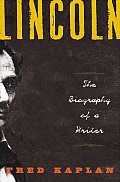Lincoln and the Creation of Archives

A veritable industry on Abraham Lincoln is in full swing once again. Fred Kaplan, Lincoln: The Biography of a Writer (New York: Harper, 2008) is an interesting addition to the literature, with some comments about Lincoln’s writing that has some insights in the creation of his archival corpus. Kaplan indicates that, for Lincoln, “language mattered because he needed it to work through what seemed to him real, to separate fact from falsehood. It mattered even more because he began to feel that only through writing and speech could be understand the world. He needed language as the tool by which knowledge was acquired and communicated. Also, he took satisfaction in how language worked and in the pleasure of words and rhythms” (p. 31). Her we have some understanding of the motivation guiding Lincoln in his correspondence, speech writing, and other writing. Later, Kaplan suggests that “Lincoln had no doubt that the written word was superior to the spoken: a text provided the advantage of stale portability and unalterable futurity” (p.134). And, we certainly have seen how this has worked out as Lincoln added a number of key texts to the American documentary canon.
In his study, Kaplan captures something of Lincoln’s skills as a storyteller, considers his literary aspirations, provides some close examinations of Lincoln’s letters as literary expositions, and describes how Lincoln carried a notebook on the campaign trail, using it to manage his thoughts and speeches (the notebook was later lost). Other aspects of the importance of documents in Lincoln’s life and career are commented on. Lincoln was elected captain of the volunteer militia company in the Black Hawk war, because, “Unlike most, he could read and write and fill out forms, and he stood taller on the ground and in the saddle than anyone else” (p. 55). Lincoln wrote a text against the divinity of scriptures. “Testimony varies as to whether it was an essay or a pamphlet-length argument. Samuel Hill and some of Lincoln’s other friends, thinking it imprudent for a rising politician to publish such views, convinced him to destroy, or forced the destruction of, the manuscript” (p. 71). There is even an extended description of an 1837 legal case, about the veracity of some deeds, where it appears Lincoln manipulated evidence to win the case (pp. 94-98).


1 Comments:
More Lincolniana of further interest in 2009 at the Library of Congress galleries -
[to the exhibition below]..."A companion volume, "In Lincoln’s Hand: His Original Manuscripts With Commentary by Distinguished Americans," will feature original essays about the most important Lincoln documents, including the Gettysburg Address and Lincoln’s Second Inaugural, by people such as writers John Updike, E.L. Doctorow, and Walter Mosley; Presidents Jimmy Carter, George H.W. Bush, and George W. Bush; Lincoln and Civil War scholars Drew Gilpin Faust, Doris Kearns Goodwin, and James McPherson; and actors Liam Neeson and Sam Waterston. The book, published by the Library of Congress with Bantam Dell, goes on sale Jan. 27, 2009. "
The upcoming LC exhibition:
http://www.loc.gov/today/pr/2008/08-199.html
News from the Library of Congress
Press contact: Matt Raymond, (202) 707-0020
October 28, 2008
National Abraham Lincoln Bicentennial Exhibition Opens Feb. 12, 2009, at the Library of Congress
"With Malice Toward None: The Abraham Lincoln Bicentennial Exhibition" opens at the Library of Congress on Feb. 12, 2009, in celebration of the 200th birthday of America’s 16th president, offering the public the opportunity to view rarely seen treasures from the Library’s collections."
"This major exhibition, made possible through the generous support of Union Pacific Corporation, runs through May 9, 2009, after which it will travel to five U.S. cities."
"With Malice Toward None: The Abraham Lincoln Bicentennial Exhibition" will chart Lincoln’s growth from prairie lawyer to preeminent statesman and address the monumental issues he faced, including slavery and race, the dissolution of the Union, and the Civil War."
"The exhibit will reveal Lincoln the man, whose thoughts, words, and actions were deeply affected by personal experiences and pivotal historic events. By placing Lincoln’s words in a historical context, the exhibition will give visitors a deeper understanding of how remarkable Lincoln’s decisions were for their time and why his words continue to resonate today."
Post a Comment
<< Home